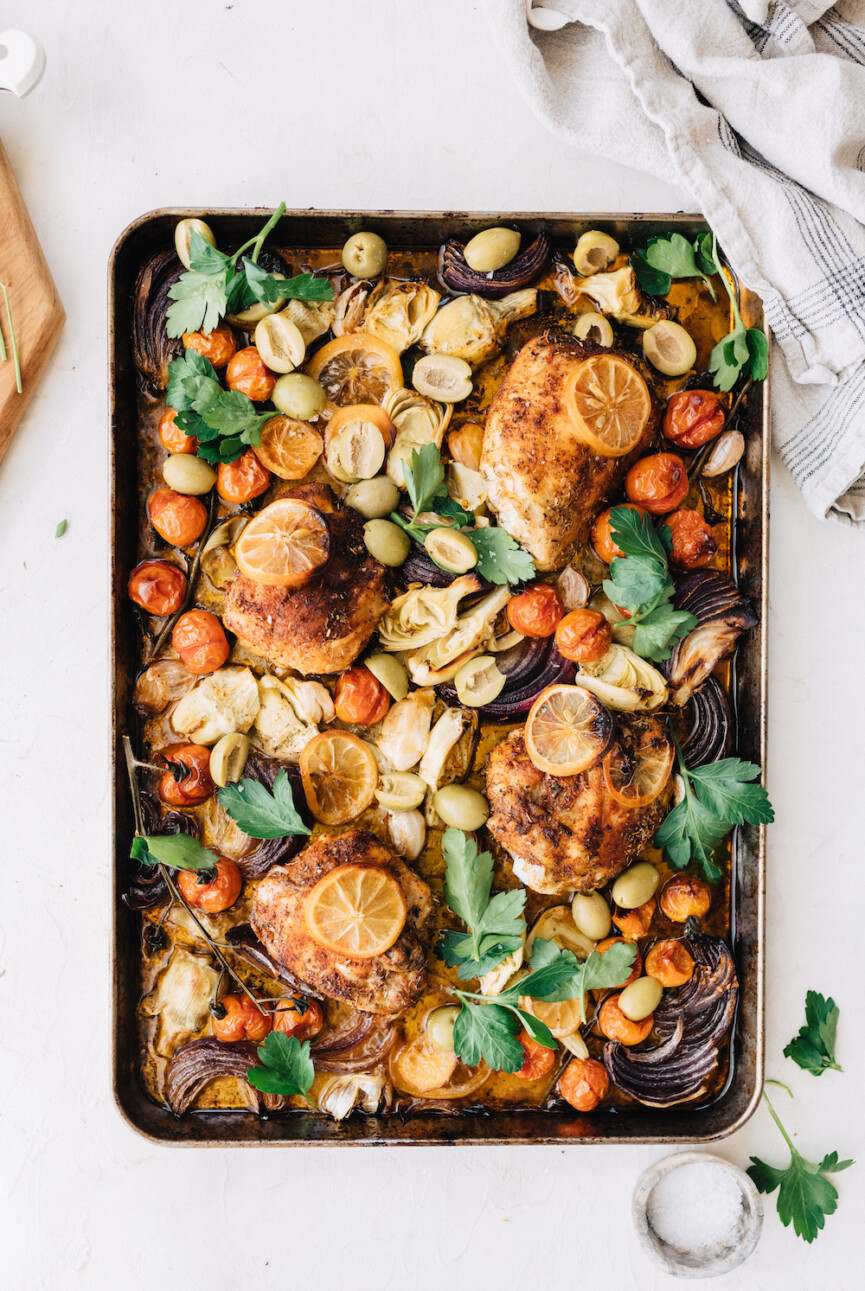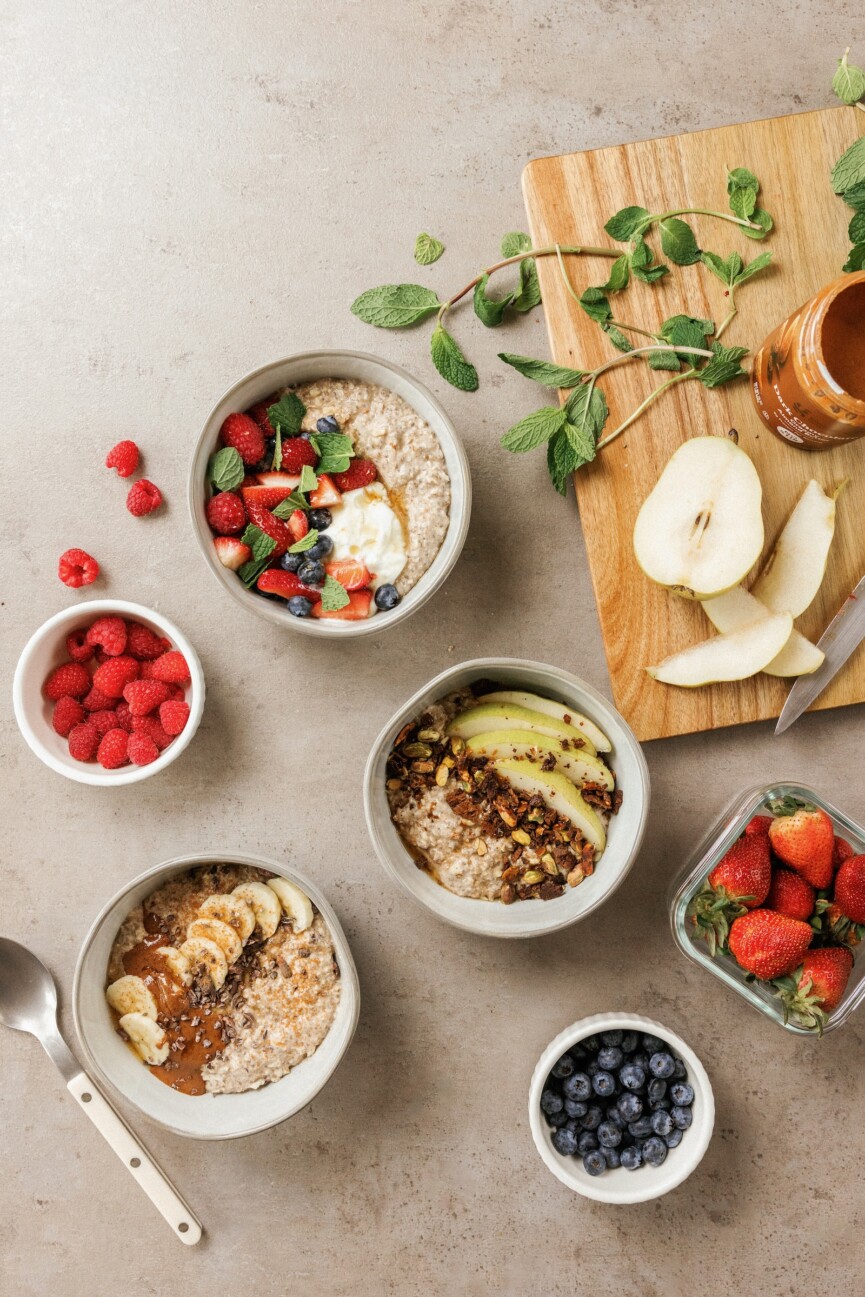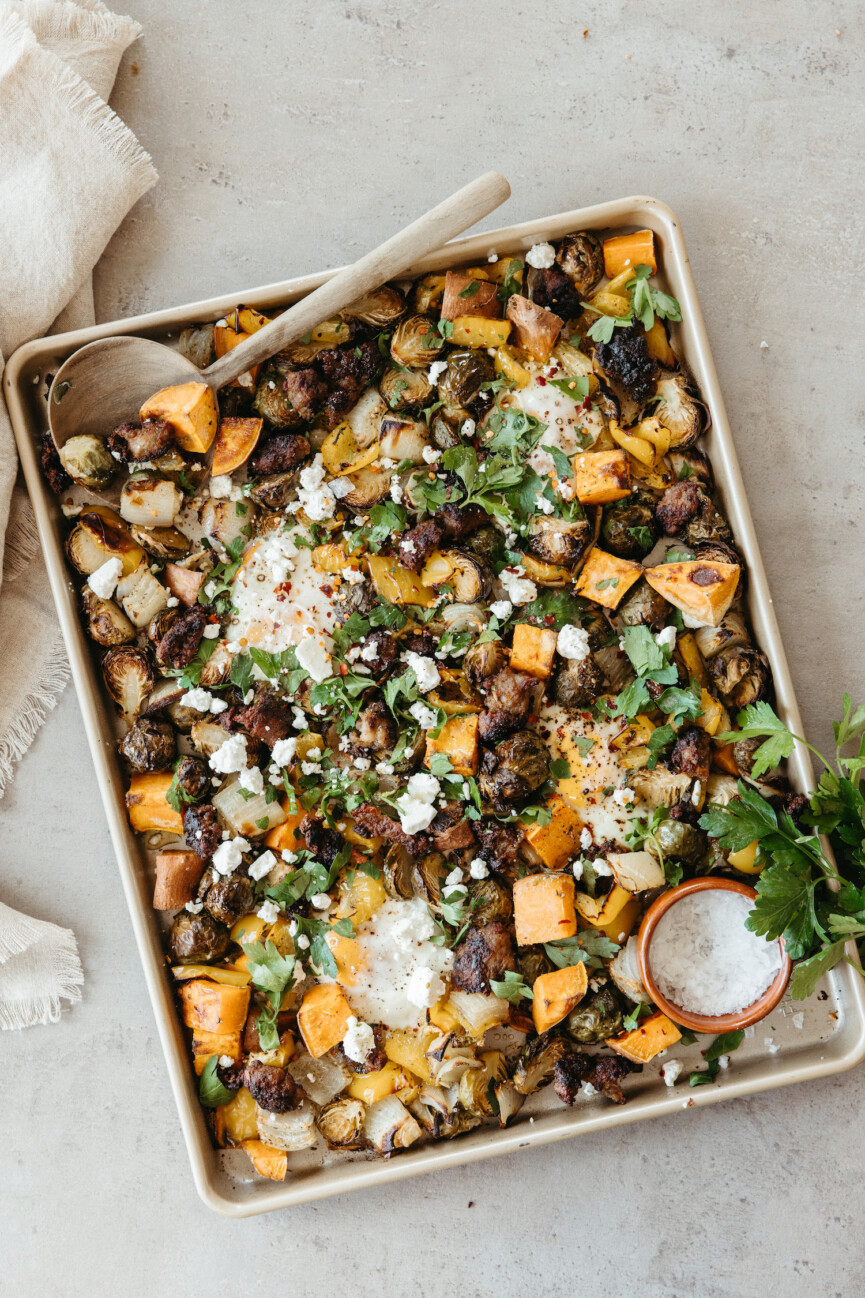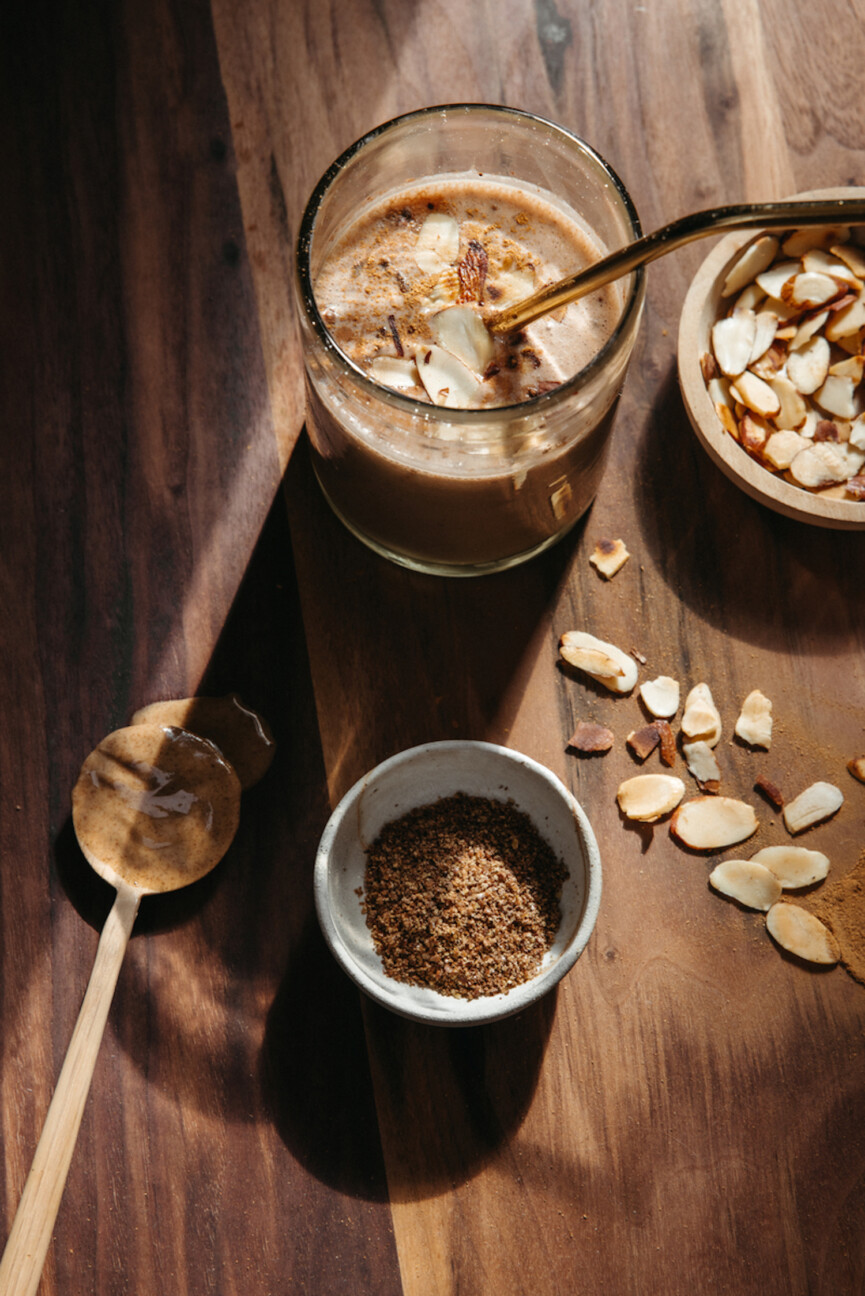I gave birth to our first son in March of 2020. Meanwhile (unbeknownst to us), the world was shutting down. By the time we walked back through our door—a newborn in tow and a scar across my belly—nothing was the same. Suddenly, the village I envisioned was a dream of the past. Be it global circumstances or my own naiveté, I felt a deep lack of collective postpartum support. In turn, I ate what was convenient and slept when I could. Truthfully, my physical and mental recovery were an afterthought. With that in mind, this is the resource I wish I had. Consider this postpartum nutrition guide the gateway to deeply nourishing yourself (or a new mother in your life).
In addition to nutrition specifics, scroll for freezer-friendly recipes, supportive supplements, and general lifestyle tips to encourage a healthy and vibrant postpartum experience.

What is postpartum?
Postpartum refers to the time frame immediately after childbirth. Also known as the puerperium, this period typically lasts about six weeks—although its exact length varies. From a medical perspective, it includes the return of a woman’s uterus to its pre-pregnancy size. There are actually three distinct phases of the postnatal period: the acute phase (6-12 hours after delivery), the subacute phase (six weeks), and the delayed phase (upwards of six months). Ultimately, postpartum is a critical time for healing, adjusting, bonding, and adapting to new parenthood.

Postpartum Misconceptions
Unfortunately, postpartum is both misunderstood and underemphasized. Thanks to societal stigmas (and for that matter, social media!), postpartum’s true intensity flies under the radar. In turn, this contributes to a slew of misconceptions. For example, many new parents assume the postpartum period is over after six weeks. But in all reality, that’s just the beginning. Recovery can take upwards of a year—or more.
Beyond physical changes, hormones and emotions need ample time to adjust. Proper recovery is a long, winding road. Knowing this helps set realistic expectations, encouraging a smoother transition into motherhood.
A Season of Rest
In the first few weeks after birth, you’re not only getting to know your baby, but you’re also learning about yourself—as a mother, caregiver, and nurturer. It is a massive undertaking. Especially as a first-time mom. Women experience physical, mental, and emotional changes unlike anything else. As a Certified Nutrition Consultant—with a specialty in postpartum nutrition—I am particularly passionate about helping women navigate this tender time. It’s a dynamic season, one that’s synonymous with healing, resting, and acclimating.

What happens to your hormones after giving birth?
During pregnancy, estrogen and progesterone increase significantly. However, once the placenta is removed after birth, these two hormones take a sharp—but intentional—dip. In essence, these estrogen and progesterone must drop for breastfeeding hormones, like prolactin and oxytocin, to do their job. Simultaneously, oxytocin surges to stimulate uterine contractions. This helps you bond with your newborn. That said, this dramatic shift often contributes to significant emotional swings.
The Baby Blues
Unsurprisingly, these hormonal fluctuations have an impact on emotional stability. The so-called “baby-blues”—where women can feel weepy, tearful, and overwhelmed—typically last for a few days (or up to 1-2 weeks). However, they can last significantly longer. If that’s the case, or they’re accompanied by anxiety, despair, or are preventing you from being able to complete daily tasks, it is important to seek evaluation for postpartum depression.

Normal Postpartum Physical Changes
Speaking of hormonal fluctuations, let’s talk about postpartum physical changes. Low estrogen levels—which stay low until you re-start your menstrual cycle, typically last throughout the duration of breastfeeding. And low estrogen can contribute to postpartum hot flashes, pelvic floor dysfunction, vaginal dryness and low libido. Hair loss (telogen effluvium) is another common symptom. However, normal hair patterns usually return by 6-15 months postpartum. Inevitably, eating to support these internal and external shifts is key.

Lifestyle Tips for a Healthy Postpartum Period
Before we dive into postpartum nutrition, what are lifestyle tips and habits that can support a nourished postpartum period?
Rest and sleep
Sleep is crucial for everyone—pregnant, postpartum, or not! But for obvious reasons, it’s the most challenging to prioritize. Nap when you can and enlist childcare support from friends and family members. It’s important to remember that sleep deprivation (and chronic stress) during the postpartum period can lead to sugar cravings, additional weight gain, and inflammation.
Hydration
Drinking plenty of water supports bodily functions and is crucial for breastfeeding mothers. Sipping on bone broth and herbal teas can also aid in everything from digestive support to mineral replenishment.
Physical activity
Once you’re cleared to exercise, go for it. Moving your body is extremely beneficial for your mental and physical well-being. Exercise helps with natural detoxification, blood sugar balance (which can help stabilize postpartum hormones), provides a boost in endorphins, helps strengthen your core after giving birth, and so much more. Whether it’s pilates, strength training, or walking, aim for consistency.
Emotional support
In case you need the reminder, your village wants to help you. If there’s ever a time to call in your support system, it’s right after you’ve given birth. Along with counseling, many women find that working with a postpartum doula can speed up their recovery time. In the very least, lean on friends and family members to help you with basic house chores and light cooking. You’re not expected to do it all—especially in the early postpartum months.
Why is postpartum nutrition important?
It’s vital for several reasons: healing and recovery, energy levels, breastmilk production, and emotional well-being. Proper nutrients are needed for everything from tissue repair to muscle recovery. They also help maintain energy levels, which—of course—are crucial when caring for a newborn. And if you’re a breastfeeding mama, you need adequate calories to produce quality breastmilk. Last but not least, certain nutrients can impact mood and help manage postpartum depression.

Nourishing Your Body After Childbirth
No matter what part of the world they live in, traditional cultures prioritize postpartum foods that are warm, soft, and easily digestible.
Additionally, new mothers are encouraged to eat slowly (easier said than done!) and sip nutrient-dense broths. For that matter, cold foods are usually not recommended. After all, these cultures believe cold foods slow down circulation (essential for optimal healing). Additionally, weight loss shouldn’t be an immediate goal. Rather, it’s best to focus on a postpartum diet that’s rich in high-quality protein, healthy fats, and cooked produce.Try to avoid high sugar and ultra-processed foods and instead focus on whole, mostly unprocessed foods.

Postpartum Nutrition: What to Prioritize
In the early days after birth, lean into foods you might turn to when recovering from the flu. Think hydrating, easy-to-digest, nutrient-dense meals like soup with sourdough bread, cooked veggies with soft-boiled eggs, and steel-cut oats with almond butter and anti-inflammatory fruit. As you can imagine, all of the organs in the abdomen are going through a massive shift, and digestion is likely to be compromised.
Eating enough
As mentioned, caloric needs increase for breastfeeding women (anywhere from 300-1,000 calories, daily). This means that requirements for all macronutrients—and the large majority of micronutrients—increase during this time as well.
Getting a balance of macronutrients
To break this down, postpartum moms need an adequate balance of carbs, protein, and fats. Starchy carbs (grains, squashes, sweet potatoes, etc.) are energy-rich and help build milk supply. Protein is the most satiating and helps rebuild tissue and muscle (aim for 25-40 grams of protein per meal). Last but not least, don’t forget healthy fats. These help stabilize blood sugar, balance hormones, and nourish breast milk.
Supporting digestion
A raw, high-fiber salad may seem like the epitome of a healthy meal, but if your digestion is compromised (normal during the fourth trimester!), that salad is akin to throwing wet logs on a weak fire. When digestion is weak, it’s best to consume cooked and fermented vegetables. A digestive enzyme is worth exploring if you foresee digestion being an issue during postpartum.

Micronutrients That Support Postpartum Healing
Along with eating enough, getting a balance of macronutrients, and supporting digestion, below are specific micronutrients that foster postpartum health.
Choline-Rich Foods
Postpartum women need choline to support mental health and brain function. It’s also important for a baby’s brain development.
- Poultry: Eggs and chicken breast.
- Liver: One of the richest sources of choline!
- Soy: A plant-based source of choline for plant-forward mamas.
Folate-Rich Foods
Folate supports the production of new cells, aids in tissue repair, and helps prevent anemia by supporting red blood cell formation (crucial for recovery and overall health after childbirth!).
- Greens: Asparagus, spinach, kale, and arugula.
- Legumes: Lentils, chickpeas, and black beans.
- Fruit: Avocado and oranges.
Omega-3-Rich Foods
Healthy fats (particularly, omega-3 fatty acids) are essential for balanced hormones, brain function, and the absorption of fat-soluble vitamins.
- Fish: Salmon, mackerel, and sardines are rich in omega-3 fatty acids (take advantage of tinned fish!).
- Cruciferous vegetables: Brussels sprouts.
- Nuts and seeds: Walnuts, chia seeds, hemp seeds, and flaxseeds.
Iron-Rich Foods
Iron helps replenish blood loss during childbirth and supports energy levels.
- Red meat: Beef and lamb are rich sources of heme iron.
- Leafy greens: Spinach, kale, and swiss chard provide non-heme iron.
- Fortified cereals: Many breakfast cereals are fortified with iron.
- Nuts and seeds: Pumpkin seeds, almonds, and cashews.
Calcium-Rich Foods
Calcium is crucial for bone health, especially if breastfeeding.
- Dairy Products: Organic (ideally, pasture-raised!) milk, cheese, and yogurt.
- Leafy greens: Broccoli, bok choy, and kale.
- Fortified plant milks: Unsweetened almond, soy, or flax milk.
Fiber-Rich Foods
Fiber aids in digestion and prevents constipation, which is common postpartum.
- Whole grains: Oats, quinoa, brown rice, and whole wheat bread.
- Fruits: Apples, pears, berries, and bananas.
- Vegetables: Carrots, sweet potatoes, and peas.
- Legumes: Beans, lentils, and chickpeas.
Other micronutrients to emphasize include magnesium, zinc, and B vitamins!

6 Supportive Postpartum Foods
With those micronutrients in mind, below are six postpartum foods that are worth keeping in your pantry and fridge.
1. Bone broth
Slow-simmered bone broth plays a key role in the postpartum practices of many traditional cultures. Not only is bone broth nutrient-dense and a rich source of collagen, but it also aligns with the traditional practice of serving new mothers warm bevvies and soups (rather than cold food).
2. Fermented ingredients
These aid in digestion, nourish breast milk, and help rebuild the microbiome—particularly for those administered antibiotics during labor. Think: kimchi, miso, tempeh, kefir, sauerkraut, etc.
3. Nut butter
Did you know that monounsaturated fats—the majority of fat found in nuts—help combat emotional fluctuations (and for that matter, fatigue!) by steadying blood sugar? A quick spoonful of nut butter can be a savior in the early postpartum days. Coconut, although not a nut, is another healthy fat to incorporate. It’s known to nourish breast milk.
4. Sardines
Sardines are a rich source of many important nutrients that new mothers need. Think: DHA, calcium, and vitamin D3. They are also available canned, which makes them a quick and easy addition to a meal.
5. Root veggies
These comfort foods (beets, acorn squash, butternut squash, etc.) are easy to roast and keep well in the fridge. Pair them with healthy fat to help keep blood sugar stable—like tahini or avocado—and increase the absorption of nutrients like beta-carotene.
6. Grass-fed liver
Rich in iron to replete losses from birth, liver is rich in vitamin A. This does double the work: supports your immune system and promotes repair of the mucous membranes in the vaginal canal. If eating liver makes you squeamish, you can opt for a grass-fed liver supplement or add liver to your food processor along with ground beef (to make these meatballs!).

Warming Spices for Postpartum
Of course, don’t forget warming spices! These are tiny but mighty nutrients to warm your postpartum body from the inside out.
- Turmeric: Incredibly supportive for the early postpartum period. Known as a uterotonic, this herb gently stimulates the uterus, which helps it return to its pre-pregnancy size. Curcumin, the active compound in turmeric, gives the root its rich, golden color. It has powerful anti-inflammatory properties that aid recovery after birth.
- Ginger: Organs shift during pregnancy to make room for your baby, which can lead to digestive complications after birth. Not only is ginger great for digestion, but it’s also a lactogenic herb that can support milk supply.
- Cinnamon and cardamom: These help warm the body, increase circulation, and restore energy. Add them to your oats and lattes.

Ingredients That Aid in Breastmilk Production
Can certain foods and herbs support lactation? The research says yes. Along with the aforementioned macro and micronutrients, hone in on oats (a traditional galactagogue), fenugreek, brewer’s yeast, fennel seeds, and garlic. Of course, staying hydrated is also critical for milk production. Drink plenty of filtered water, herbal teas (like fenugreek and fennel teas), chicken or veggie broth, and high-water produce like cucumbers and oranges.
Helpful Postpartum Supplements
While food should be the primary source of nutrients after childbirth, certain supplements can support postpartum recovery:
Prenatal vitamins: Continue taking your prenatal vitamin to ensure adequate intake of essential nutrients. My favorites? Perelel and WeNatal.
Omega-3 fatty acids: Taking fish oil can help with inflammation and support brain health.
Vitamin D: Vitamin D supports bone health and immune function, especially important if you have limited sun exposure.
Probiotics: Can aid digestion and support a healthy gut microbiome.
Iron: If you have low iron levels (via a blood test), an iron supp may be necessary.

Stocking Your Freezer with Healthy Meals and Snacks
To bring this full circle: eating nourishing foods is an essential part of recovering after birth—as well as replenishing breast milk. You need the energy and strength to care for yourself while simultaneously caring for your baby. And this is no small feat! Ideally, extended family and friends will bring you food, but you can also prepare healthy, pre-cooked freezer meals and snacks before your little one arrives.
1. Turmeric Chicken Immunity Soup
With the notion that food is medicine, this soup has easy-to-find ingredients and is loaded with anti-inflammatory ingredients. Make a batch of this nourishing recipe for multiple healing lunches or dinners.
Other postpartum soups we love: Curry Red Lentil and Vegan Butternut Squash.
2. One-Bowl Morning Glory Muffins
Keep these in your freezer and pop one or two into the microwave for a wholesome yet decadent boost of energy. Pair a muffin with a cup of Greek yogurt for a satisfying postpartum snack.
3. Asparagus Frittata
Not only are eggs rich in choline and vitamin D, but they’re a convenient and versatile ingredient to have on hand. Prep this frittata ahead of time, slice, and keep it in the freezer for any time of day.
4. Chicken Burger Lettuce Wraps
Prep these patties in advance, pop them in the freezer, and eat them reheated on a bed of greens, in a sandwich, or in a bowl over brown rice.
5. Chocolate Banana Almond Butter Smoothie
Don’t underestimate smoothie baggies! Put together bags of fruit, protein powder, seeds, and nuts. Keep these in the freezer, add the ingredients to a blender (along with milk, yogurt, etc.) and your hydrating smoothie will be ready in no time.

The Best Postpartum Meal Delivery Services
When it comes to enhancing your postpartum health—in a convenient way that doesn’t skimp on nutrients—consider the following postpartum meal delivery services:
- Chiyo: Eastern food therapy meets nutritional science with this deeply nourishing postpartum meal delivery service. Their holistic, inclusive, and proactive approach to maternal care makes it that much easier to heal your body.
- Milky Oat: The testimonials speak for themselves. Milky Oat offers a six-week program for intentional fuel during the early postpartum days—and women rave about it. You can also tack on meals for your partner!
- Kitchen Doula: This program offers nourishing meals for motherhood, healing, and beyond. Whether it’s your first months home with a new baby, you’re recovering from illness or injury, or grieving from loss, Kitchen Doula is here to support you.
- Territory: While not a postpartum-specific meal delivery service, Territory’s crew of nutrition advisors bring their unique perspectives, advanced training, and real world know-how to the table. Plus, unlike other services that churn meals out of massive central commissaries, their independent chefs work in their own fully certified, local commercial kitchens!






